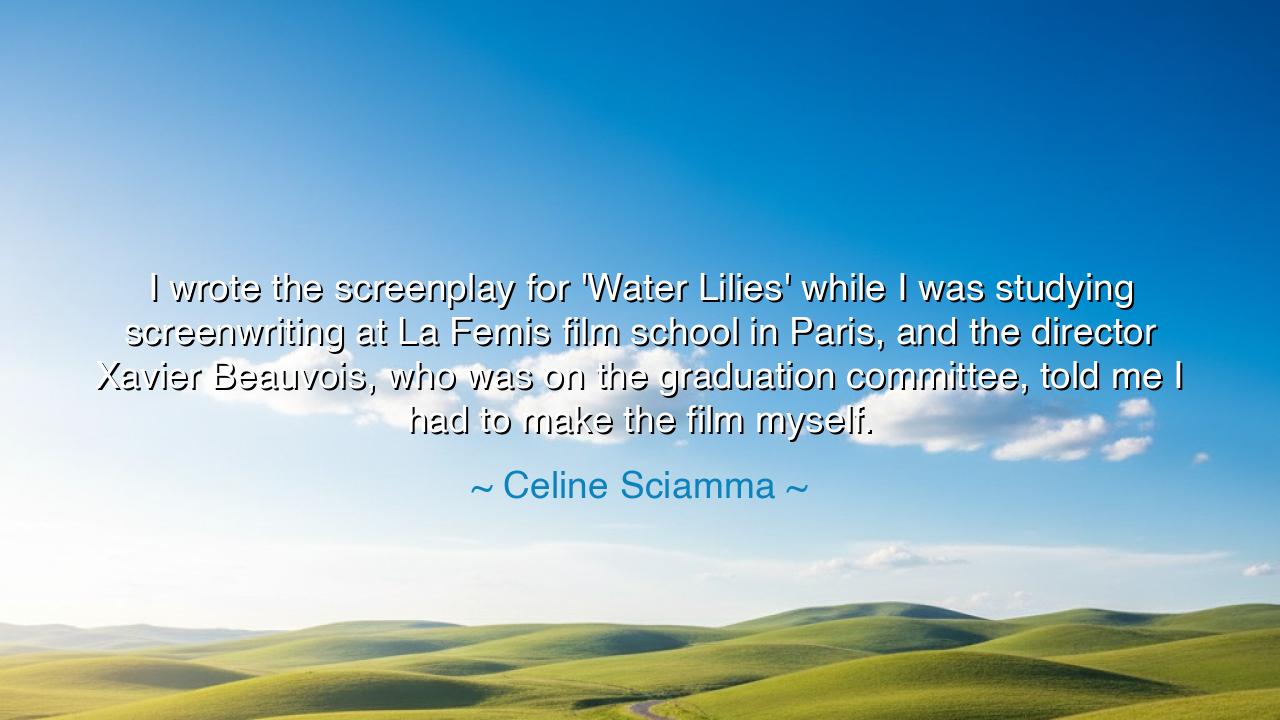
I wrote the screenplay for 'Water Lilies' while I was studying
I wrote the screenplay for 'Water Lilies' while I was studying screenwriting at La Femis film school in Paris, and the director Xavier Beauvois, who was on the graduation committee, told me I had to make the film myself.






Hear, O seeker of truth and creation, the words of Céline Sciamma, spoken with quiet strength and luminous conviction: “I wrote the screenplay for ‘Water Lilies’ while I was studying screenwriting at La Fémis film school in Paris, and the director Xavier Beauvois, who was on the graduation committee, told me I had to make the film myself.” These words, though soft in tone, echo with the thunder of destiny — the moment when art calls its maker not to hide behind the page, but to step forward and give form to the vision burning within.
The meaning of this quote lies in the sacred transformation of the creator — the crossing from writer to director, from dreamer to doer, from one who imagines to one who manifests. While Sciamma studied at the famed La Fémis, she did what many artists do — she wrote, she crafted, she learned to shape stories through the language of the screen. But what she did not yet know was that her story would also become her summons. When she presented her screenplay for “Water Lilies,” she expected evaluation; instead, she received a calling. The wise Beauvois, seeing in her work the voice of authenticity, urged her to take up the mantle of authorship in its truest form — to make the film herself. And thus, the apprentice became the master, the student became the storyteller, and the idea became incarnate.
The origin of this wisdom is ancient and eternal: that the one who conceives a vision is often the only one who can bring it to life in its purest form. In the old temples of Athens, sculptors were taught not only to draw their statues but to carve them, for only through touch could the artist understand the soul of the stone. In the same way, Sciamma’s journey reminds us that true creation is not complete until the hand and the heart are one. To delegate one’s vision is sometimes to risk losing its spirit. And so Beauvois, in his insight, did not give her advice — he gave her a challenge, the kind of challenge that awakens greatness.
Consider, O reader, the story of Michelangelo Buonarroti, who was commissioned to paint the ceiling of the Sistine Chapel, though he considered himself primarily a sculptor. At first, he resisted, feeling unworthy of the task. Yet, as he climbed the scaffolding and raised his brush, something miraculous occurred: his mastery over marble became mastery over light. The hand that had freed David from stone now freed divinity from color. He did not wait for permission or perfection — he simply began. And like Céline Sciamma, he discovered that the act of creation itself reveals one’s true nature. For it is not the title we bear — writer, sculptor, student — that defines us, but the courage to bring what is within us into the world.
The lesson hidden in Sciamma’s words is that every creator, at some point, must confront the threshold between learning and doing. We study the rules, we seek mentors, we refine our craft — yet all of that is but preparation for the moment when the teacher says, “Now, you must do it yourself.” That moment is terrifying, for it strips away the safety of guidance and thrusts us into the nakedness of responsibility. But within that fear lies power. When Sciamma took up the challenge and made “Water Lilies” — her first film — she not only proved her ability but discovered her voice. That act of self-creation would lead her to become one of cinema’s most distinctive storytellers, whose films — from “Tomboy” to “Portrait of a Lady on Fire” — burn with authenticity and emotional clarity.
Thus, her story becomes a mirror for all who create. The world is full of those who wait for permission — who say, “When I am ready, I will begin.” But readiness is an illusion, and permission is often self-granted. Sciamma’s transformation reminds us that greatness begins not when others declare us capable, but when we act as if we already are. To write your story is noble; to bring it into being is divine. To be told by another, “You must make it yourself,” is not a command, but a revelation — a reminder that no one else can give birth to your vision as you can.
So take this lesson, O listener, and carry it as a torch within you: when life presents you with your “Water Lilies,” do not hand it off to another. Rise, take ownership of your creation, and give it form. Let your fear be your fire, your uncertainty your compass. Whether you paint, write, teach, or build, remember that there comes a sacred moment when the apprentice must no longer seek approval, but must act. In that moment, creation ceases to be a dream and becomes destiny. And when you cross that threshold, as Céline Sciamma once did, you will know the profound truth of the artist’s journey — that to bring forth what is within you is to become what you were always meant to be.






AAdministratorAdministrator
Welcome, honored guests. Please leave a comment, we will respond soon